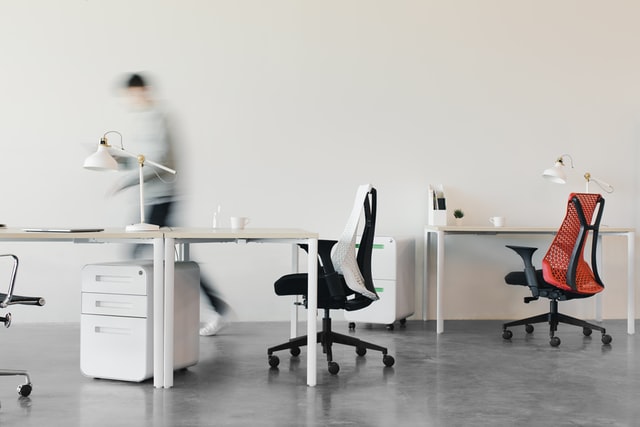20 April 2021
New research from IWFM has revealed that 63 per cent of employees now believe the office to be unnecessary - a rise of a fifth since the first lockdown.
The poll, which surveyed 2,000 office workers across the country in March 2021, found that the vast majority of employees will expect a level of hybrid working in the future - with nearly half (44 per cent) of the workforce planning to work from the office for 3 days or fewer a week.
“The truth is, home versus office working should not be viewed as a binary choice between focus and connection."
–Chris Moriarty
Director of Insight, IWFM
Flexible Working Most Popular With 18-24-Year-Olds
Demand for hybrid working is particularly prevalent in the younger demographic. Two-thirds (66 per cent) of 18-24-year-olds admitted that not being offered flexible work patterns would cause them to look for a new job. Yet more than a third (38 per cent) of this demographic feel their employer is pressuring them to return to the office - risking losing new talent.
The Institute of Workplace and Facilities Management (IWFM) is calling on employers to ensure that hybrid working is accessible for all; providing adequate choice and support for employees to perform their role from multiple locations, in order to avoid losing younger workers to competitors.
More than three-quarters (79 per cent) of 18-24 year olds believe that they will be equally as productive or more productive working from home. This demographic is also working the most unpaid overtime from home - on average 11.6 extra hours a week - and has invested on average nearly £300 in creating a suitable working environment at home (£292).
Avoiding "A Knee-Jerk Return to Pre-Pandemic Status Quo"
Chris Moriarty, Director of Insight at the Institute of Workplace and Facilities Management comments: “More than a year on, we continue to see employers striving to strike the right balance between remote and office working. The benefits of the office have not been forgotten, yet we continue to become accustomed and comfortable with our home working routines.
“The truth is, home versus office working should not be viewed as a binary choice between focus and connection. A true commitment to ‘hybrid working’ will give employees and employers flexibility to work in a way that is best suited to them - allowing them to reap the productivity and social benefits of both home and office working environments, how and when it best suits their needs. Employers should now make every effort to provide staff with genuine choice to perform their role wherever they feel their performance would be best supported - adapting the office space, incentives and policies to reflect the changing nature of the workspace environment.”
Moriarty continues: “The COVID-19 crisis has left a permanent mark on our view of the workplace - and a knee-jerk return to the pre-pandemic status quo risks serious implications for businesses in attracting and nurturing talent. The responsibility now falls on organisations to think about their employee experience beyond the boundaries of their corporate workspace. Effective employers will already be thinking of how to support employees and provide a suitable working environment for them, wherever and however they choose to work.”
Picture: a photograph of a set of office desks, with the blurred figure of a person seen in the background
Article written by Ella Tansley | Published 20 April 2021
Share
Related Articles
IWFM Research Highlights Flexibility and Personalisation as the Key to the Future of the Office
New research released by IWFM and MillerKnoll has revealed that most companies remain uncertain about what their post-pandemic workplaces will look like.
For the...
Read Full Article
Rees-Mogg Urges Civil Servants to Make Use of London Office Space
Cabinet minister Jacob Rees-Mogg, in a letter to cabinet colleagues, is urging civil servants to reduce how much time they spend working from home.
In a letter...
Read Full Article
COVID-19 Working From Home Guidance – What’s the Latest?
Employees in England are no longer being asked to work from home, as the government removes Plan B rules. But is this change as simple as encouraging a mass return to the...
Read Full Article
Landmark Hosts Panel Debate on the Future of Work
Adapting to remote working, becoming comfortable with disruptive technologies and creating a friction-free workplace were all on the agenda at flexible office space...
Read Full Article
The Changing Needs of the Workforce – A Psychotherapist's View
Psychotherapist Noam Sagi explores how facilities managers can better respond to a post-pandemic workforce.
Noam Sagi is a Psychotherapist, Change...
Read Full Article
Research Shows UK Workers Under Pressure to Return to Unfit Workplaces
Data from the Institute of Workplace and Facilities Management warns that half of UK workers are being pressured to return to unfit office spaces by their...
Read Full Article
IFMA Publishes Advice on Post-Pandemic Workplaces
The IFMA Foundation has launched a preview chapter of “Work on the Move 3: Building Better Workplaces After the Pandemic”, a follow-up book on integrated...
Read Full Article
Soft Service Costs Increased by 8% in 2024, Says Colliers
Colliers’ latest Occupier Cost Index shows costs remain out of step with occupancy, with soft services increasing by 8 per cent in 2024.
The Occupier Cost Index...
Read Full Article
IWFM Launches Information Management Guide
A new guide to help facilities management professionals strengthen their information management practices has been launched by IWFM.
The guidance provides a framework...
Read Full Article
2025 IWFM Impact Awards Winners Announced
Twenty-two winners have been named at the 25th edition of The Institute of Workplace and Facilities Management Awards 2025.
Awards were presented for customer...
Read Full Article

.gif)

.gif)


.gif)





.png)

.png)
